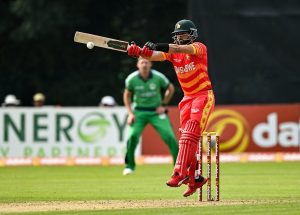

Sikandar Raza wants to play down the fact he has been one of the breakout players at this Men’s T20 World Cup.
Few, though, would deny the spin-bowling all-rounder has been the best performer as Zimbabwe reached the Super 12s stage in Australia.
A shock win over Pakistan gave Zimbabwe hope of reaching the semi-finals. That hope was all but extinguished in Wednesday’s defeat by the Netherlands, although Raza again shone, top scoring with a 24-ball 40.

The 36-year-old was born in Punjab, Pakistan, but has a far more complex cricketing and national identity.
He had been the star performer with the ball against Pakistan, the country of his birth, taking three wickets as his unique story came full circle.
“I was sent video of my cousin crying and her brother laughing because he was supporting me and she was supporting Pakistan,” he tells BBC Sport.
The 36-year-old was born in Punjab, Pakistan, but has a far more complex cricketing and national identity.
In Pakistan, Raza trained to be in the air force only for that career path to be blocked by a failed eyesight test.
Instead, Raza travelled to Glasgow in the mid-2000s to study software engineering at university and laughs at the suggestion he’s the only player at the World Cup to know coding.
“Maybe in C++ but not in Java,” he says, before the conversation moves on to more comfortable, less brain-twisting, ground.
“I graduated but I don’t think I had a future.”
It was in Scotland where Raza grew as a cricketer and, more importantly to him, as a person.
“Some of the common manners that sometimes I lacked, I learned that in Scotland,” he says.
“I was going with college mates to a fish and chip shop and opened the door and walked in.
“A friend of mine, she said ‘no, you hold the door’.”
Having played cricket for fun in Pakistan, his time in Glasgow gave Raza his first real experience of club cricket – an international career at this stage as distant as his family who had now emigrated to Zimbabwe for work.
He was a fast bowler and middle-order batter when he joined Weirs Cricket Club in southern Glasgow, after being put in touch with a course-mate’s relative who played at the club.
Over the coming seasons, while completing his studies, he played at various clubs – Weirs, Prestwick and Ayr – eventually being paid as a club professional.
It exposed him to many of Scotland’s cricket grounds and, of course, the weather.
“In the first couple of years we used to travel to Dundee and Aberdeen,” he says.
 “Of course you play almost every game in drizzly conditions but, because we were so young, happy and excited, we were just happy to get a game.”
“Of course you play almost every game in drizzly conditions but, because we were so young, happy and excited, we were just happy to get a game.”
One club, Stoneywood Dyce – where the security fences of Aberdeen’s airport line the boundary edge – sticks in the memory, in particular.
“It was always windy, always cold and you always had planes taking off and landing,” he says. “But we were just excited to play.”
Away from this World Cup, Scottish cricket has been dealing with serious allegations of racism, following an independent review which found the governance and leadership of the sport to be institutionally racist.
It is a topic Raza is happy to chat about during our meeting at Zimbabwe’s team hotel in Brisbane.
“I’m glad you asked me,” Raza says, sitting up in his chair.
“I was so well looked after, not just as an individual, but as a human being.”
Raza recalls, name checking the mother of team-mate Craig Greenwood, how halal teas were made for him and other Muslim team-mates.
“During fasting time the club was very respectful,” Raza says.
“There would be no shouting ‘why are you not chasing the ball faster?’. During prayer time they would be quiet in the changing room.”
That’s not to say Raza is suggesting there is no issue.
“I think it was Michael Holding’s words. If you cannot educate yourself you cannot eradicate the problem,” Raza says.
“Instead of banishing them, make sure people are getting educated. Without educating things on these issues, the problem will exist.
“We must come to a point where no-one has issues with anyone.”
Raza cannot speak more highly of Scotland and the people he met there.
“We are practically family,” he says. “Scotland gave me everything I needed at that phase of life.”
He admits he is a cricketer of the Scottish club system but his first-class debut came back in Zimbabwe, where he became a regular in their domestic competition.
He made his international debut in 2013 and, in a stroke of fate, his Test debut came against Pakistan later the same year.
But it has been in the last year Raza’s game has hit new heights, hitting three one-day international centuries in August and being named Player of the Tournament in the qualifiers for the ongoing World Cup in July.
He began the first stage of the World Cup with 82 from 48 balls in a win against Ireland and has taken nine wickets.
He is not the first cricketer to play against the country of his birth, and will almost certainly not be the last.
He is, however, clear on his identity, despite those mixed reactions back in Pakistan.
“I still am a proud Pakistani,” he says. “The beauty about the two countries is they have never taken my identity away from me.
“Pakistan respects that I am a Zimbabwe product. They spent money and time on me to build me.
“Zimbabwe people respect that I was born in Pakistan and I am of that origin.
“I am still a very proud Pakistani and I am very proud Zimbabwe cricketer.”
He’s Sikandar Raza – the man born in Pakistan, made in Scotland and now flying the flag for Zimbabwe. – bbc.com